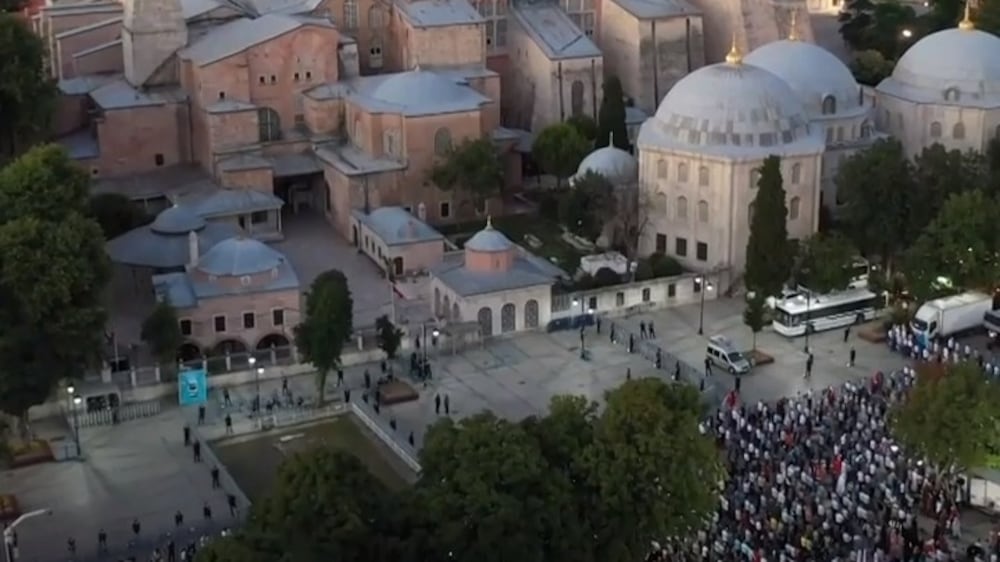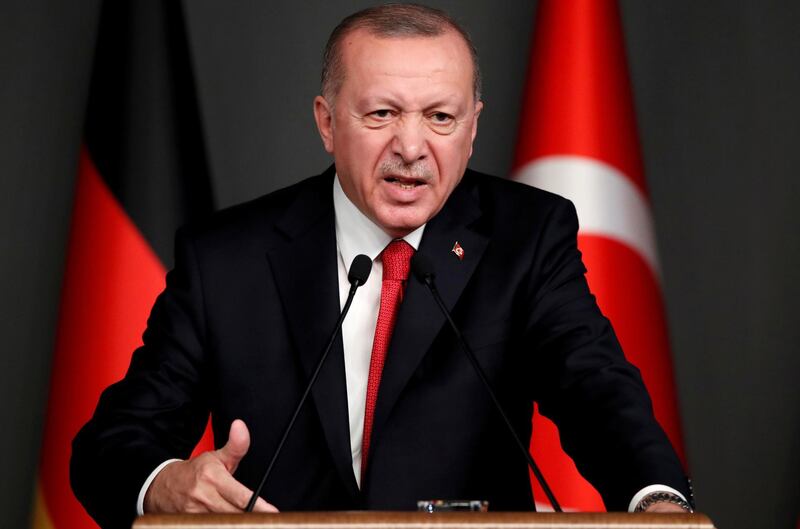Debate around Turkey’s withdrawal from an international treaty on domestic violence has created a split within the country’s ruling party, and even among President Recep Tayyip Erdogan’s family.
In recent weeks there have been calls from within the Justice and Development Party (AKP) to leave the Istanbul Convention, a Council of Europe agreement that Turkey was the first to sign in 2011.
But other senior party figures, such as Family Minister Zumrut Selcuk and Mehmet Mus, deputy chairman of the parliamentary party, are reportedly opposed to leaving the treaty.
Within Mr Erdogan's household, divisions have emerged as AKP-linked associations with the president’s children as board members have taken opposing stances.
Tugva, a youth foundation led by his son Bilal, has called for Turkey to leave the convention while Kadem, a women’s organisation of which Mr Erdogan’s daughter Sumeyye is vice-president, is pushing to stay.
Mr Erdogan has remained publicly silent on the issue, which is due to be debated by his party’s central executive committee on Wednesday as women across the country gather to support the convention.
Muslims pray outside the Hagia Sophia after a court ruled on its conversion to a mosque

“I get the sense that the party is very divided on this issue,” said Berk Esen, an associate professor of international relations at Bilkent University in Ankara.
Dr Esen said that the issue seemed to have split the party along generational and gender lines.
“From opinion polls, the majority of Turkish voters do not know about the convention but people who know about it, even AKP voters, seem to be more supportive of it,” he said.
“That’s a dangerous sign for Erdogan if he ends up challenging the convention.
"And when his daughter and his son are involved, it really cuts close to home and that’s why he’s probably been silent.”
A recent MetroPoll survey found 64 per cent of the public opposed scrapping the convention.
Among AKP supporters, this figure dropped to 50 per cent as opposed to 25 per cent who wanted to leave.
The prospect of leaving the convention has caused alarm in Turkey, where cases of murdered women – often at the hands of a boyfriend, husband or former partner – create headlines on a near daily basis.
The We Will Stop Femicides group said 474 women were murdered by men last year. Last month there were 36 such cases, five more than in July 2019.
Since 2008, 62 per cent of women murdered in Turkey were killed their male partners. Another 28 per cent were carried out by other family members.
Lawyer Selin Nakipoglu said that over the past six years “war has been waged against women” in Turkey.
“Instead of thinking about how to prevent the murder of women and develop policies, the Istanbul Convention is open for debate,” Ms Nakipoglu said.
The debate among conservatives has focused on claims that the convention promotes immoral lifestyles and undermines the family.
This argument has often been fuelled by religious groups, or tarikats, which have grown in influence in recent years.
“Support for leaving the convention seems to come primarily from older generation males,” Dr Esen said.
“Erdogan and his party are no longer as popular as they used to be so they’re more dependent on support from these religious groups, who now feel strong enough to challenge a convention that was signed by the AKP.”
The convention’s backers have pointed out that it protects not just women, but also children and men from violence.
“They say it’s disrupting the family structure but even though we asked many times, not a single person could show which clause of the convention disrupts families,” said Hale Dalkiran, from the Aydin Women’s Solidarity Platform.
Those opposed to the convention are having to tread carefully given support within the higher reaches of the AKP.
A columnist for the Yeni Akit newspaper was forced to backtrack after he compared the treaty's supporters to "prostitutes" – comments some suggested were an attack on Mr Erdogan's daughter.
For many, such language lies behind the rising violence against women.
“Women are killed every day in this country,” Ms Dalkiran said.
“There are women who have written their killer’s name on the wall in blood.
"What’s the reason for ignoring male violence and wrapping your tongue around the sanctity of the family?”







